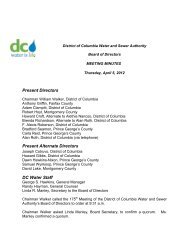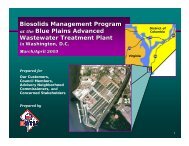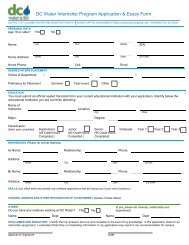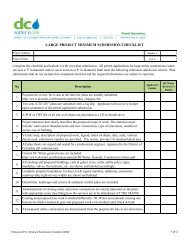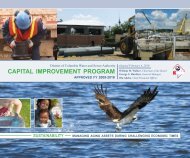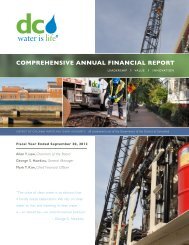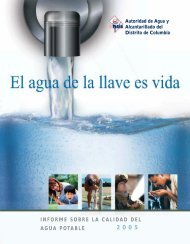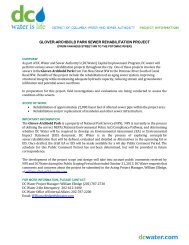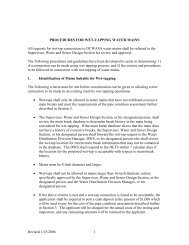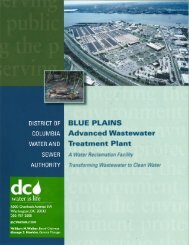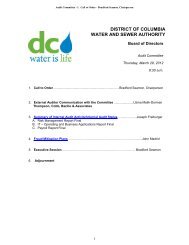FY 2020 Capital Improvement Program - DC Water
FY 2020 Capital Improvement Program - DC Water
FY 2020 Capital Improvement Program - DC Water
Create successful ePaper yourself
Turn your PDF publications into a flip-book with our unique Google optimized e-Paper software.
the District of Columbia’s budget submission to Congress. <strong>DC</strong> <strong>Water</strong>’s request for capital authority is ultimately made to and<br />
approved by the U.S. Congress.<br />
DISBURSEMENTS AND PROJECT LIFETIME BUDGETS<br />
As in the past, we have presented the CIP on both a project lifetime basis and cash disbursement basis. During the CIP review<br />
process, we perform an extensive review of the total project, or “lifetime” budgets, which also reflect historical spending prior to the<br />
current ten-year period, projected spending beyond the current ten-year period and project contingencies. Project lifetime budgets<br />
are our primary area of focus in budget development and day-to-day monitoring. In addition to lifetime budgets, we also develop<br />
cash disbursements forecast. Actual cash disbursements are critical to forecasting the anticipated level of rate increases and the<br />
amount and timing of capital financings. While cash disbursements are a function of project lifetime budgets, they reflect a more<br />
realistic projection of actual “cash out the door” excluding contingencies and taking into account historical and projected completion<br />
rates.<br />
As in prior years, the budget document includes a comparison of this year’s vs. last year’s lifetime project budgets by program area<br />
for the Board’s review. Changes have been made to some of the project lifetime budgets approved from last year due to a change in<br />
project scope, engineering cost estimates, site changes and other related issues. In addition, some projects are either closed or<br />
dropped from the CIP. Projects for which all activities have been completed during a given fiscal year are listed as ‘Closed’ during<br />
that fiscal year; these same projects are, then, listed as ‘Dropped’ in the immediately following fiscal year.<br />
CAPITAL AUTHORITY<br />
As part of <strong>DC</strong> <strong>Water</strong>’s enabling legislation, Congressional appropriation authority is required before any capital design or construction<br />
contract can be entered into. The <strong>FY</strong> 2013 request totals $606.1 million, and reflects the following:<br />
• Remaining authority from prior years’ appropriations;<br />
• Projected commitments in <strong>FY</strong> 2012 and <strong>FY</strong> 2013;<br />
• Planned <strong>FY</strong> 2014 and <strong>FY</strong> 2015 commitments, to ensure adequate authority exists, in the event that any projects are<br />
accelerated.<br />
• Risk allowance associated with the start of construction for the Blue Plains Tunnel<br />
Due to the timing of the Congressional appropriations process, authority requests must be made well in advance of commitment<br />
execution. Including projected <strong>FY</strong> 2014 and <strong>FY</strong> 2015 commitments (a 24-month ‘look ahead’) allows us adequate flexibility to<br />
continue with contract commitments in the event that the U.S Congress delays budget approval and allows us to quickly accelerate<br />
or reprioritize projects into earlier years as approved by the Board. While this gives us flexibility to reprioritize projects, it should be<br />
II - 9



